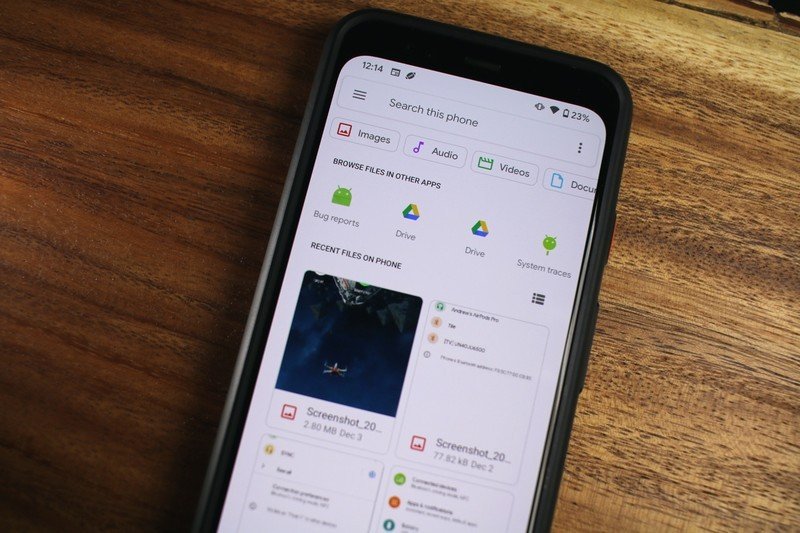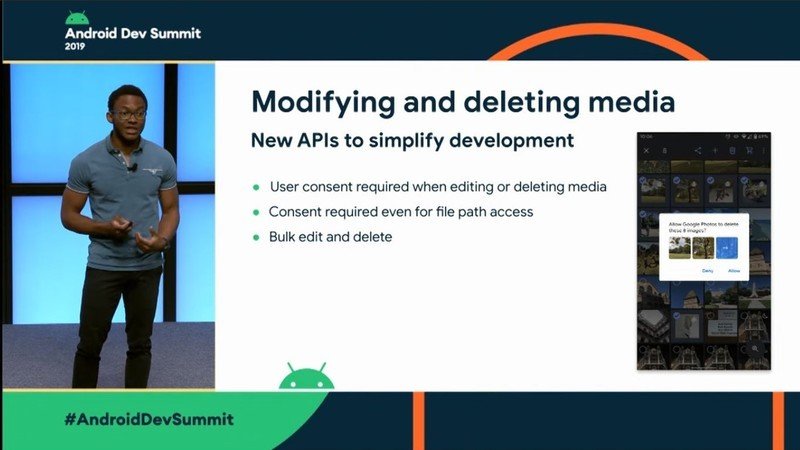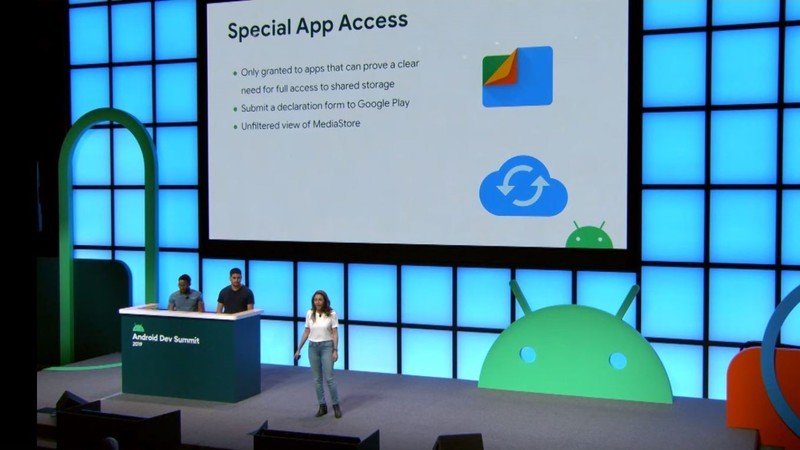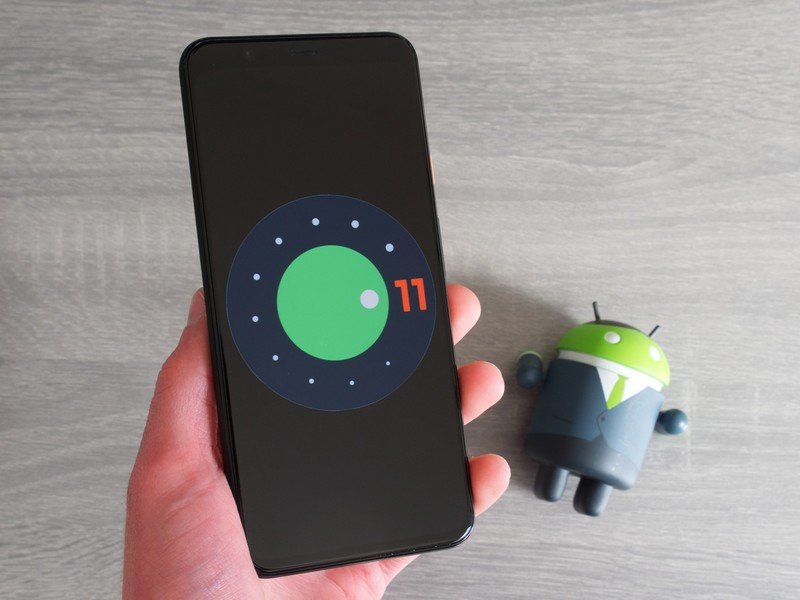User Scoped Temp Data Msgr Photo for Upload What Does It Mean

When Android ten was still in its early beta days, Google had plans for a big alter in the way that apps could access the files and folders in your telephone'south external storage (things similar photos that you or other apps placed in the /data/media folder, not the SD carte du jour present in many Android models).
This change was known as Scoped Storage, and its purpose was to kill the corruption of the READ_EXTERNAL_STORAGE permissions that so many apps and developers like to asking.
These changes were originally slated to apply to every app on a telephone running Android x or subsequently, but because of programmer backlash Google changed course and only required the employ of Scoped Storage for apps that target Android API level 29, which is Android 10. But with Android 11 Scoped Storage is back, and Google isn't likely to change its mind this time.
Tiptop 10 features in Android 11 you demand to know most right at present
How Scoped Storage works

At one time Android worked like any other desktop operating organisation when information technology came to accessing your files; things like documents, photos, music or anything else you wanted to store on your device were there for any other app to open. You said information technology was OK for an app to do this when you lot installed it, and it just did. Using the app'southward native UI, you could browse the file organization and meet all your public files.
With Android iv.4 KitKat, Google started making changes to and adding restrictions on how an app could admission files it did not own, and with Android 5.one, the Storage Admission Framework was implemented. This gave apps a manner to access files in other folders using an Android API instead of using standard programming file operations. It ... works. It'southward tedious and fairly unpopular, but information technology is available and past now almost every developer of an app that needs this sort of global admission has at least tried it out to see how suitable information technology is or isn't based on their needs.
With Scoped Storage, things are both more restrictive and easier at the same time. A compatible app is given its own folder for user-facing data. Apps already have a private sandboxed binder for storage of their required files and this is unavailable to whatsoever other app. Scoped Storage gives the ability to create a 2nd folder for files the app creates. Think of an app like a vocalism recorder, for instance; it needs somewhere to store the audio files information technology creates.
Developers take been groomed to use specific methods for file access since Lollipop, but they're very unpopular.
The app needs no permission to read or write any file in this folder, then you lot aren't prompted to grant any permissions when y'all first run it concerning file read and write locations; apps besides demand permission for each and every binder they want to admission but do not ain.
Developers who need to access folders not endemic by their app will need to use the Storage Access Framework APIs. That means it needs to query the API to encounter if the files exist and go its device location and then ask the user for permission to utilise it. This has been the recommended all-time exercise for file admission since Android Lollipop, and then it's not exactly new. Merely with Scoped Storage, information technology is now strictly enforced and no longer "optional".
Why make this change?

Google gives 2 valid reasons why it's making this change: Security and to reduce leftover "app clutter."
The reason for a alter is proficient, but it means more work for developers.
On the security forepart, this alter does a few things. First and foremost, information technology allows a developer to accept their ain space on the storage of your device that is private without request for any specific permissions when first run. And no other app can admission any document it creates without you saying it tin.
Second, and equally of import, it cuts back on the abuse of the READ_EXTERNAL_STORAGE permission. When yous grant this permission for an app today information technology gives access to the unabridged external storage where we save things similar photos, private documents, videos, and other potentially sensitive files. With Scoped Storage enforced, apps only can see their own data folders plus certain media types like music files using other storage APIs.
New APIs have been developed forth with a program for developers of file managers to get "special access."
These APIs tin can grant access for viewing, writing, deletion, and even majority actions through the use of a system-built user prompt that lets y'all allow or deny the action. These API'southward should simplify evolution for apps like music players or photograph editors even without Scoped Storage being enforced.
Reducing app clutter needs little caption. When you uninstall an app, the files and folders information technology drops all over your device storage in one case you lot gave it permission to do so stay backside. Enough of these leftovers can first to affect performance, peculiarly if the files apply a common proper name that may be repeated by another app. If a developer builds an app that creates media like a camera app or music recorder, for example, he or she tin use the standard media folder locations to deposit the things you create so they are non removed if the app is uninstalled.
What virtually file managers?

Developers of apps like file managers that want access to every file in the external storage can do so through the Storage Access Framework once granted permission by Google — nosotros learned in Oct 2019 at the Android Developer Height that a plan assuasive for "special access" was being implemented.
Legitmitate apps need these special permissions.
A user would give permission for a file manager app to access the root (tiptop-level folder) of the external storage, thus granting recursive access to every binder and file inside of information technology. Since this is a pretty broad selection and ane of the goals of Scoped Storage was to reign in apps that want this level of admission, it's skillful that Google will take a special expect at apps who desire to do this and grant permissions for legitimate apps like your favorite file manager.
Scoped Storage is going to happen this fourth dimension

Early feedback for Scoped Storage was not very good. At that place was even a petition that asked Google to remove the feature rethink its implementation.
Which is generally what Google did. Scoped Storage was available in the official Android x release, just developers were not required to use information technology. But that's all about to change. From the Android Developers site.
To requite developers additional time for testing, apps that target Android ten (API level 29) can nonetheless request the requestLegacyExternalStorage aspect. This flag allows apps to temporarily opt out of the changes associated with scoped storage, such as granting access to different directories and different types of media files.
Any app that is targeted for Android eleven or later must apply the new storage APIs, and that includes Scoped Storage. Changes to Google Play'southward programmer understanding say that starting August one, 2020 all new apps submitted to Google Play must target Android 10 or later, and all updates to existing apps must target Android x or later on as of Nov one, 2020. Expect this same behavior and next year apps will likely be required to target Android 11.
That means that unless an app developer is willing to permit an app wither and die in a bounding main of old apps, Scoped Storage must be implemented soon. Luckily, this time Google has listened to feedback and made things easier for apps that have a need for total or special access and the new APIs in Android 11 make other things easier, besides. A safer and more secure Android is something we all should desire.
Have you listened to this week'due south Android Cardinal Podcast?

Every week, the Android Fundamental Podcast brings y'all the latest tech news, assay and hot takes, with familiar co-hosts and special guests.
- Subscribe in Pocket Casts: Audio
- Subscribe in Spotify: Audio
- Subscribe in iTunes: Audio

Jerry is an amateur woodworker and struggling shade tree mechanic. There'south zero he can't take apart, but many things he can't reassemble. You lot'll find him writing and speaking his loud opinion on Android Fundamental and occasionally on Twitter.
Source: https://www.androidcentral.com/what-scoped-storage
0 Response to "User Scoped Temp Data Msgr Photo for Upload What Does It Mean"
Post a Comment